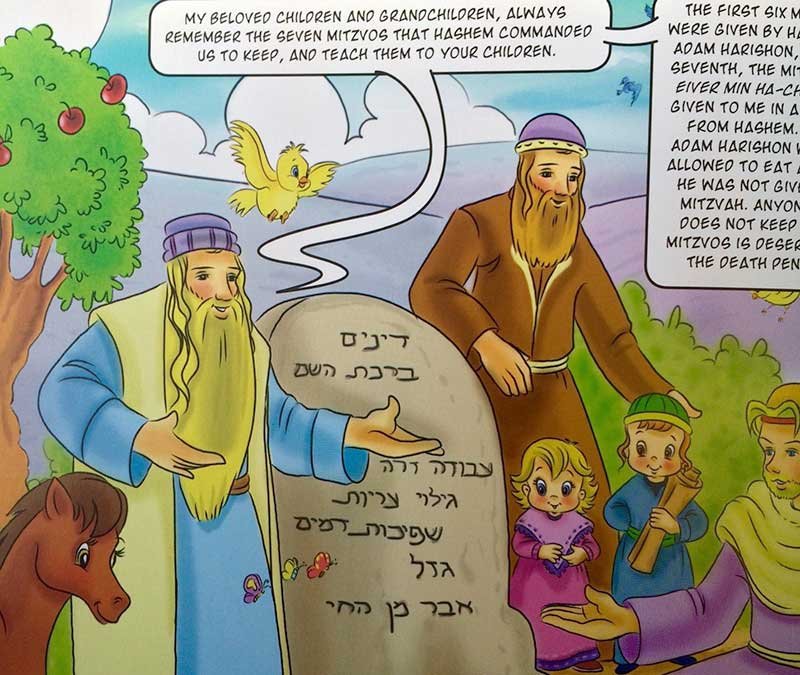Every year, during the week in which we read Parashat Noach, I always hear someone comment that, although Noah was righteous in his day, if he were in another generation he would have simply been an average Joe.
Where does this idea come from? Torah portion Noach opens with:
These are the generations of Noah. Noah was a righteous man, blameless in his generation. Noah walked with God. (Genesis 6:9)
This verse seems to speak very positively of Noah, but Rashi points out that sages have interpreted this verse two ways:
Some of our Sages interpret [in his generation] favorably: How much more so if he had lived in a generation of righteous people, he would have been even more righteous. Others interpret it derogatorily: In comparison with his generation he was righteous, but if he had been in Abraham’s generation, he would not have been considered of any importance. “Noah walked with God”: But concerning Abraham, Scripture says (Genesis 24:40): “[the LORD] before whom I walked.” Noah required [God’s] support to uphold him [in righteousness], but Abraham strengthened himself and walked in his righteousness by himself. [1]
So which is it? Was Noah a truly righteous man or just by comparison to his generation? I would argue that Noah was indeed righteous and not just comparable to his generation.
Rashi’s comments on the first part of the verse seems to take the position that Noah was in fact worthy of praise:
“Noah was a righteous man”: Since Scripture mentions him, it tells his praise, as it is said (Proverbs 10:7): “The mention of a righteous man is for a blessing.” Another explanation [for why the names of the children are not mentioned immediately following “These are the generations of Noah”]: To teach you that the main generations [progeny] of the righteous are good deeds. [2]
We should accept the Torah’s words outright that Noah was in fact a righteous man. The Midrash Tanchuma (Noach 5) states that Noah’s righteousness can be compared to that of Joseph both of whom cared for the needs of all created beings. The midrash records the opinion of Rabbi Nehemiah who states:
“He was righteous in his generations,” and all the more so [had he lived] in other generations. One can compare this to a bowl of rose oil located in a place with a foul odor, where its aroma spreads, and all the more so if it is put in a place with fragrant aroma. (Midrash Tanchuma, Noach 5) [3]
His point is that if Noah shone brightly in a world of darkness how much more so would he shine in a world of light. We even find in the Hoshanot prayers of Hoshana Rabba calling upon the righteousness of Noah to bring deliverance to the Jewish people:
In the merit of [Noah] the one who was perfect in his generations, he escaped by his abundant righteousness, and was rescued form the inundation upon the arrival of the Flood of water for [the nation that declares,] “I am a wall,” may you bring salvation now, for you are our Father.[4]
There are various traditions that Noah kept various commandments that were later given explicitly to the Jewish people:
- He was said to be born circumcised (Midrash Tanchuma Noach 5; Avot deRabbi Natan 2)
- He kept Shabbat (Or HaChayim)
- He observed the laws of first fruits (bikkurim) (Jubilees 7:36-37)
- He observed the prohibition not to eat the fruit of trees for the first three years (orlah) (Genesis Apocryphon; Jubilees 7:36-37)
- He celebrated Shavu’ot (Jubilees 6:15-24)
There is even a somewhat humorous custom in Orthodox children’s picture books to portray Noah and his sons with head coverings, long beards, and pe’ot (side locks).

Noah and his sons pictured in an Orthodox Jewish children’s book with head coverings, long beards, and pe’ot (sidelocks). Rabbi Mordechai Chalamish, Noach and the Flood (Feldheim), 2015.
While some of this is obviously anachronistic, it nevertheless points out that in Jewish tradition throughout the ages many have had a very high opinion of Noah and considered him to be a truly righteous individual.
Moving to the New Testament, we see that the apostolic sages had a very high opinion of Noah as well. The writer of Hebrews praises Noah for believing in something he could not see:
By faith Noah, being warned by God concerning events as yet unseen, in reverent fear constructed an ark for the saving of his household. By this he condemned the world and became an heir of the righteousness that comes by faith. (Hebrews 11:7)
It would certainly take a tremendous amount of faith to build a big boat in light of a prophecy about a coming deluge. The Apostle Peter states that Noah was “a herald [or preacher] of righteousness” amidst “the world of the ungodly” (2 Peter 2:5). In other words, Noah was not satisfied to just save himself but sought to bring the whole world to repentance and to the ways of HaShem.
According to apostolic tradition we should view Noah as a righteous man who was able to stand strong for God despite the wicked ways of the world around him. Noah was not just righteous in his generation but righteous in spite of his generation. This should be an inspiration to all of us who are flowers of Messiah to stand strong against the unrighteous onslaught of the world and hold fast to HaShem’s Torah and our discipleship to the Master. Noah is a role model for all of us.
Footnotes:
- Translation from: http://www.chabad.org/library/bible_cdo/aid/8171/jewish/Chapter-6.htm#showrashi=true.
- Ibid.
- Translation from: https://www.judaicapress.com/products/metsudah-midrash-tanchuma-8-vol.
- Translation from: http://www.artscroll.com/Books/9781578193042.html.
Source: First Fruits of Zion
